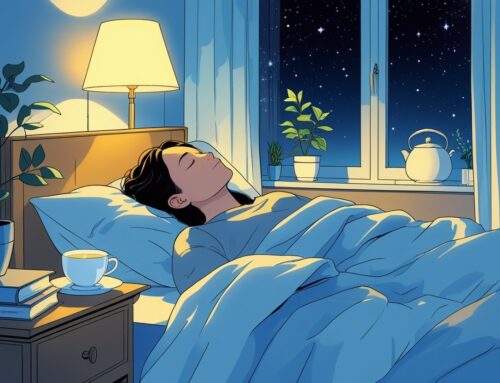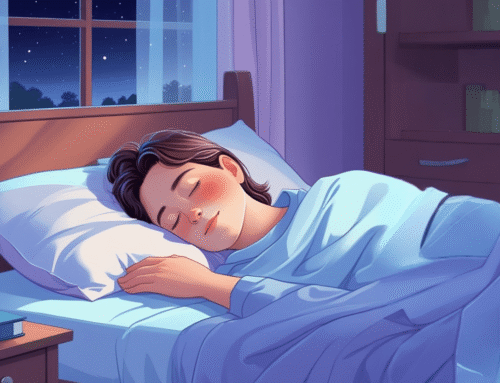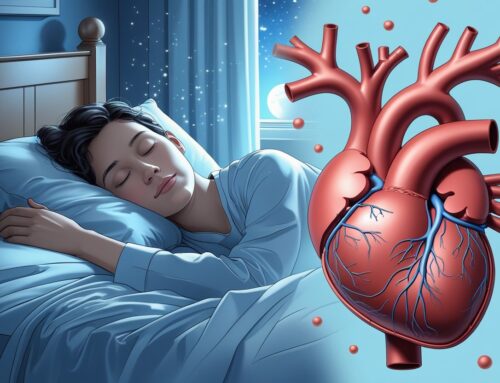People with PTSD usually struggle to sleep because their minds remain on high alert, even during times meant for rest. This can cause problems such as insomnia, nightmares, or excessive sleeping. Sleep issues form a central part of PTSD, and addressing them is important in recovery and overall mental health.
The link between PTSD and sleep problems runs deep, and it stems from the brain’s response to trauma. Many people avoid sleep since they feel vulnerable, which makes it hard to break the cycle. Gaining a better understanding of these obstacles can help shape effective strategies for improving sleep.
There are various ways to deal with sleep problems related to PTSD. Adjusting lifestyle habits, creating a secure sleeping space, and exploring treatments can all contribute to better rest. Learning about these options gives real hope for people dealing with PTSD and sleep difficulties.
Key Takeaways
- PTSD can lead to severe sleep issues like nightmares and insomnia.
- Feeling safe while sleeping matters greatly for those with PTSD.
- Lifestyle adjustments and treatments can enhance sleep quality.
- Choosing a mattress that provides support, pressure relief, motion isolation, and cooling can greatly improve sleep quality and support recovery from PTSD.
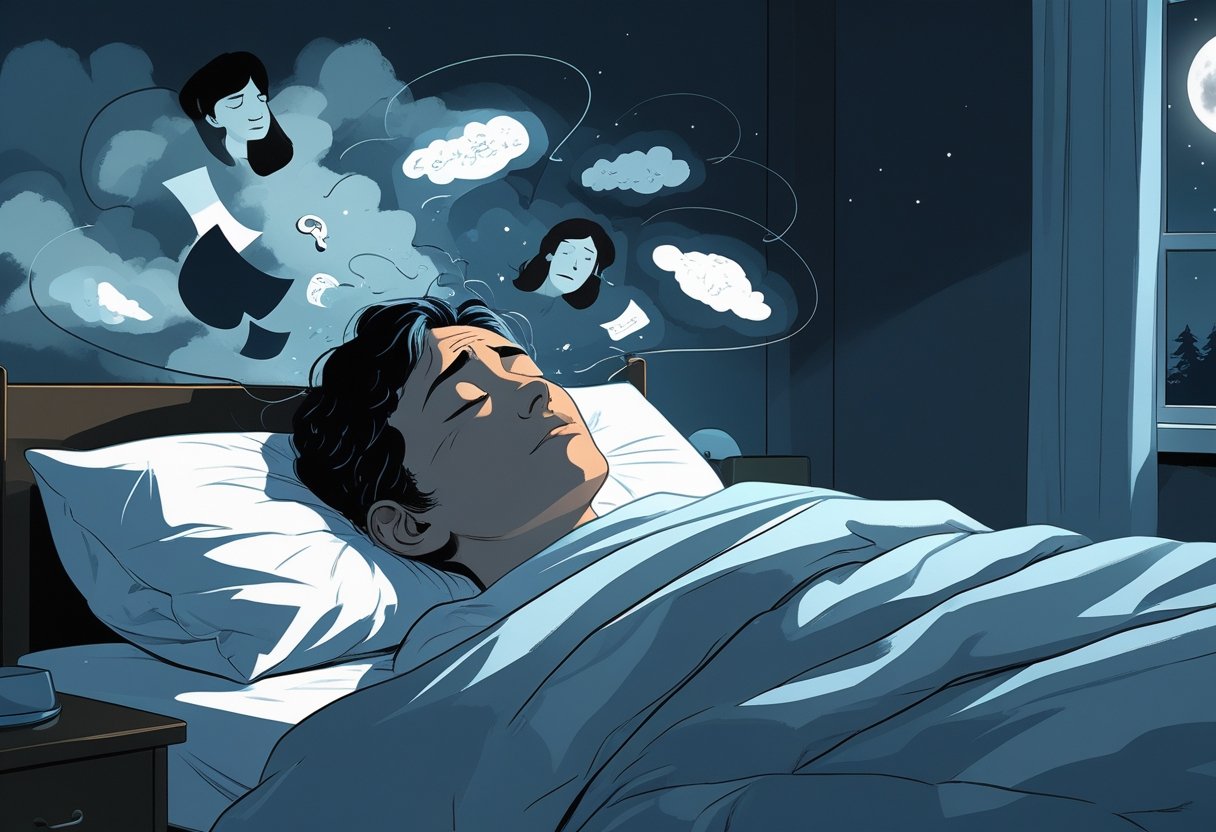
Understanding PTSD and Its Impact on Sleep

Post-traumatic stress disorder (PTSD) affects the brain and body in ways that disrupt normal sleep patterns. People with PTSD struggle to fall asleep, wake up frequently during the night, or face distressing dreams. These sleep issues can intensify PTSD symptoms and create a cycle that feels impossible to break.
What Is PTSD?
PTSD is a mental health condition that occurs after experiencing or witnessing a traumatic event. It brings intense fear, helplessness, or horror during or following the incident. Symptoms include flashbacks, severe anxiety, and emotional numbness. Many people with PTSD relive the trauma through recurring memories or nightmares, which make daily life challenging and disrupt normal routines. PTSD is diagnosed when these symptoms persist for more than a month and interfere with a person’s ability to handle everyday tasks.
How PTSD Affects Sleep Cycles
PTSD changes normal sleep cycles, especially during rapid eye movement (REM) sleep, the stage when most dreams take place. People with PTSD wake up more often during the night and spend less time in restorative deep sleep. These disruptions lead to poor sleep quality, so individuals feel exhausted even after spending a full night in bed. Since the brain cannot process traumatic memories properly during sleep, nightmares and nighttime anxiety increase, which further fragments rest.
Common Sleep Disorders Linked to PTSD
People with PTSD face multiple sleep disorders, including:
- Insomnia: Difficulty falling asleep or staying asleep, which is very common with PTSD.
- Nightmares: Frequent distressing dreams connected to the traumatic event.
- Sleep Apnea: Breathing interruptions during sleep, reported more frequently among PTSD patients.
These disorders heighten daytime PTSD symptoms, such as irritability and difficulty focusing. Addressing sleep issues with targeted treatments helps ease PTSD’s overall impact on daily life and mental well-being.
Sleep Disturbances Associated With PTSD
PTSD causes specific sleep problems that disrupt rest and daily function. Many people with PTSD struggle to fall asleep or stay asleep because of anxiety and stress. Nightmares and disturbed sleep cycles worsen these problems, which leads to tiredness during the day.
Insomnia in PTSD
Insomnia remains a common issue for those with PTSD. It involves trouble falling asleep or waking up too early without being able to return to sleep. Stress from trauma keeps the mind alert, which makes it difficult to unwind before bed. People dealing with PTSD-related insomnia face frustration and heightened anxiety, and this makes sleep even harder to attain. This sleep loss affects memory, concentration, and mood stability. Treatments typically combine therapy with medication to improve sleep patterns and lower anxiety levels.
Night Terrors and Nightmares
Nightmares connected to PTSD usually replay traumatic events in vivid detail. These episodes can jolt someone awake, creating intense fear or panic. Night terrors occur less frequently but involve more severe episodes where a person may scream, thrash, or appear awake yet remain unresponsive. Both nightmares and night terrors interrupt deep sleep stages, which prevents restorative rest. They increase fear of sleeping and sometimes lead to avoiding bedtime entirely.
Managing these symptoms often includes trauma-focused therapy along with relaxation techniques that help reduce the frequency of nightmares.
Sleep Quality and Daytime Fatigue
Even when people with PTSD sleep, their rest usually lacks quality. PTSD affects both the depth and continuity of sleep, which causes frequent awakenings and lighter sleep stages. These disruptions leave them feeling exhausted and unfocused throughout the day. Daytime fatigue creates difficulties in work, relationships, and emotional stability. It also raises the risk of substance use since some try to self-medicate in hopes of sleeping better.
Treatment works to enhance sleep quality and improve daytime alertness through behavioral strategies and medical care.
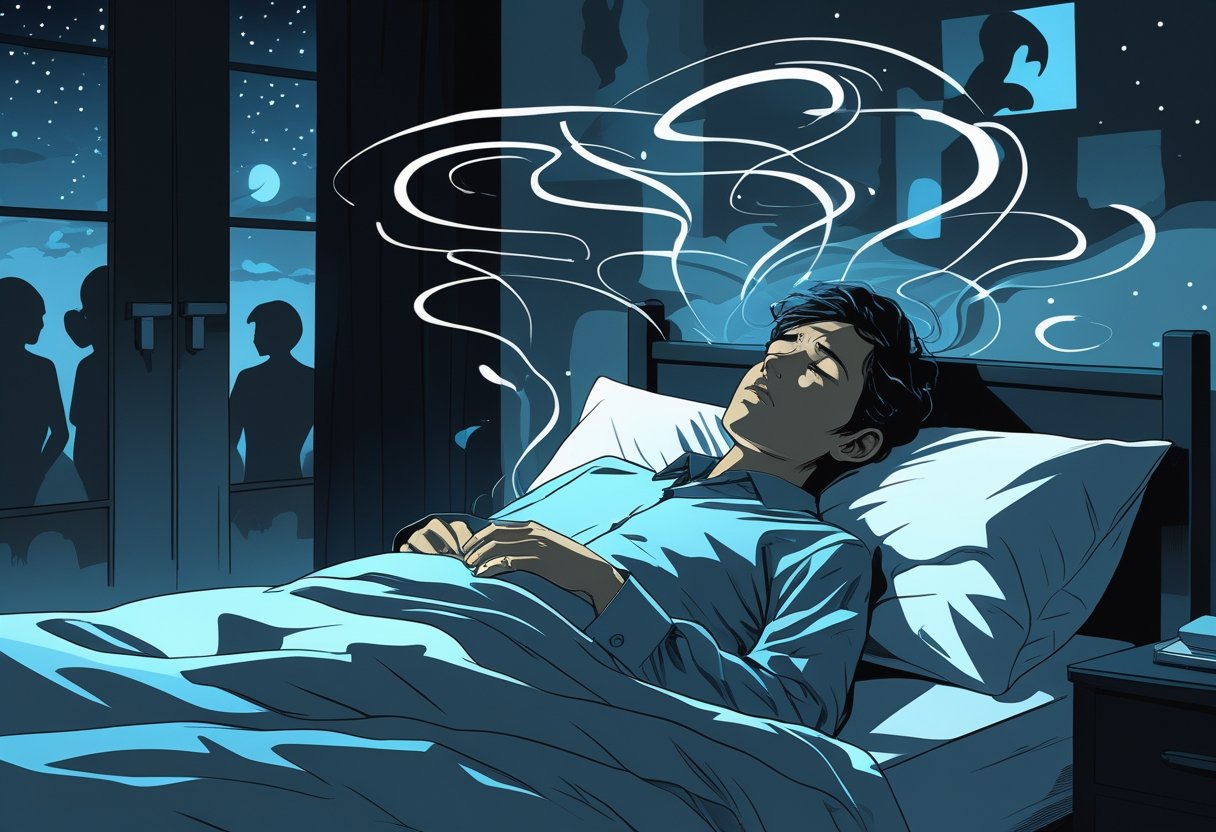
How to Help Someone With PTSD Sleep Better
Helping someone with PTSD improve sleep requires focusing on emotional support, creating a secure sleeping space, and guiding them toward healthy sleep routines. These steps address common issues such as nightmares, anxiety, and waking during the night.
Supporting a Loved One With PTSD
Providing steady emotional support reduces stress and improves sleep. Listen without judgment, show patience, and encourage professional help if needed.
Nightmares and flashbacks often occur, so acknowledge their presence without forcing the person to talk before they feel ready. Let them know help exists. Offer to join them in calming activities before bedtime, such as gentle stretching or deep breathing, to ease anxiety. Therapy or counseling brings long-term benefits. Support groups or trauma-informed therapists help address PTSD’s impact on sleep. Remind your loved one their feelings are valid and they are not alone, which builds trust and fosters a sense of security.
Creating a Safe Sleep Environment
A safe, calming bedroom reduces feelings of threat that disrupt sleep for someone with PTSD. Adjust lighting, sound, and temperature to improve comfort.
Some helpful tips include:
- Use blackout curtains or an eye mask
- Add a white noise machine or soft music
- Keep the room cool and well ventilated
- Remove clutter and items that trigger fear
Personalizing the space with familiar items, such as photos or comforting scents, helps the person feel more secure. Ensure they feel in control of their surroundings. Avoid technology and stressful stimuli near bedtime.
Encouraging Healthy Sleep Habits
Building regular habits supports deeper, more restful sleep. Routine reduces night anxiety and insomnia linked to PTSD.
A daily schedule could include:
- Going to bed and waking up at the same time
- Avoiding caffeine or heavy meals before bed
- Limiting screen time at least an hour before sleep
- Practicing relaxation techniques like guided meditation or light exercise during the day
Physical activity tires the body and reduces stress, although it should happen earlier in the day. Avoid late-day naps since they can disrupt nighttime sleep. Consistency remains crucial for these habits to take effect.
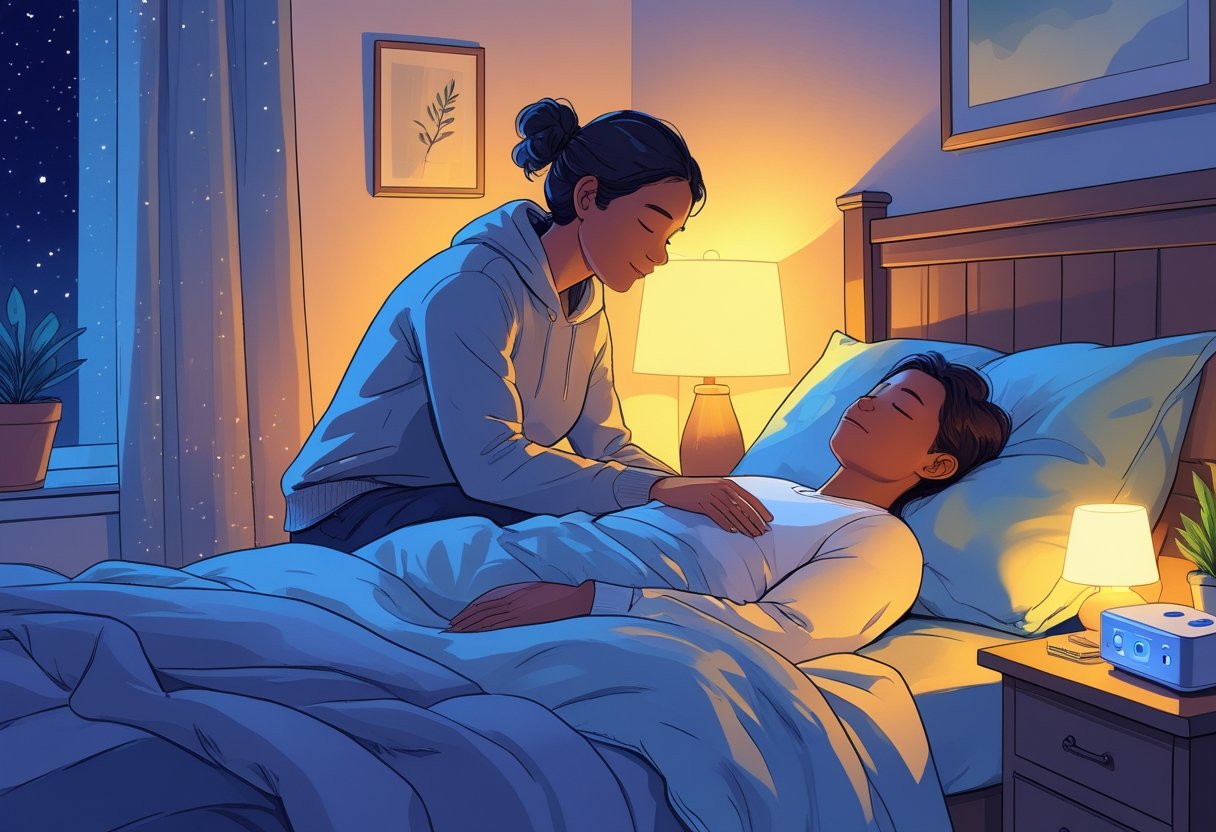
Treatment Options for PTSD-Related Sleep Problems
People with PTSD often struggle to fall asleep, stay asleep, or experience frequent nightmares. Treatment usually combines therapy, medications, and relaxation methods to improve sleep quality and ease symptoms.
Cognitive Behavioral Therapy for Insomnia (CBT-I)
CBT-I is a structured approach that aims to change thoughts and behaviors contributing to insomnia in PTSD patients. It improves sleep habits through techniques such as sleep restriction, stimulus control, and education on sleep hygiene. Patients identify and replace negative thoughts about sleep with healthier perspectives. This therapy also offers strategies to lower worry and tension tied to trauma-related sleep issues. CBT-I effectively reduces insomnia in PTSD and delivers lasting results without medication side effects.
Medications for Sleep Disturbances
Doctors may prescribe medications to address problems with falling asleep, staying asleep, or nightmares linked to PTSD. Common options include certain antidepressants, prazosin for nightmares, and sleep aids. Prazosin reduces trauma-related nightmares by blocking the effects of stress hormones. Although medications provide relief, they can cause side effects and are best used as part of a comprehensive treatment plan rather than a standalone solution.
Physicians choose medications based on symptom patterns, severity, and patient response. Combining medication with therapy can lead to better results.
Relaxation Techniques and Mindfulness
People with PTSD often struggle to sleep because their bodies stay on high alert. Simple relaxation practices can help calm the nervous system and make it easier to rest. Things like slow breathing, tensing and relaxing muscles, or listening to guided imagery can ease tension and quiet racing thoughts before bed.
Mindfulness meditation is another great tool as it teaches you to pay attention to the present moment without judgment. This can lower feelings of hyperarousal and improve sleep quality. These methods are safe, easy to practice, and often work well alongside therapy or medication.

Lifestyle Changes to Improve Sleep With PTSD

Improving sleep for someone with PTSD often requires clear and targeted actions. Regular movement and solid bedtime habits both are important in addressing sleep issues linked to PTSD. These changes can lessen nightmares and make falling asleep easier.
Exercise and Physical Activity
Exercise reduces stress and anxiety, which frequently worsen sleep for people with PTSD. Moderate daily exercise, such as walking or jogging for 30 minutes, improves sleep quality. However, intense workouts close to bedtime should be avoided since they can make it harder to fall asleep.
Physical activity also regulates the body’s internal clock, which helps keep sleep patterns consistent. Studies show that individuals with PTSD who exercise regularly tend to experience fewer nightmares and feel more rested at night. It is wise to start slowly and carefully, especially when physical health concerns exist.
Sleep Hygiene Practices
Good sleep hygiene includes habits that prepare both mind and body for rest. A fixed sleep schedule trains the body to expect sleep at the same time each night. Avoiding screens and bright lights for at least 30 minutes before bed reduces alertness caused by blue light. A calming bedtime routine supports better sleep as well. Activities such as reading, practicing deep breathing, or listening to soft music can help. The bedroom should remain dark, quiet, and cool. It also helps to limit caffeine and avoid heavy meals several hours before going to bed.
Following these sleep hygiene practices consistently can ease PTSD-related sleep disruptions and lead to more restful nights.
When to Seek Professional Help for Sleep Issues
Persistent sleep problems related to PTSD should never be ignored. Recognizing when sleep disturbances like nightmares and insomnia require professional support helps manage symptoms and improve daily life.
Identifying Severe Sleep Problems
Sleep issues turn severe when they persist for several weeks, despite efforts to address them. Symptoms include constant difficulty falling or staying asleep, frequent nightmares, or waking up feeling unrested. Daytime effects such as excessive sleepiness, fatigue, or trouble focusing also signal serious problems.
People with PTSD insomnia often find their anxiety or other mental health symptoms worsening. Nightmares causing fear or panic that interrupts sleep multiple nights each week point to the need for professional help. Overlooking these signs prolongs suffering and complicates recovery.
Consulting With Mental Health Professionals
Turning to mental health professionals provides targeted treatments like Cognitive Behavioral Therapy for Insomnia (CBT-I), which tackles thoughts and habits tied to poor sleep. Therapists also help process trauma, which reduces nightmares and night anxiety.
Professionals sometimes recommend combining therapy with medication. Support groups or trusted companions give emotional comfort, yet ongoing sleep problems affecting daily life call for clinical attention. Open discussions with a therapist ensure PTSD-related sleep issues receive prompt and effective care.
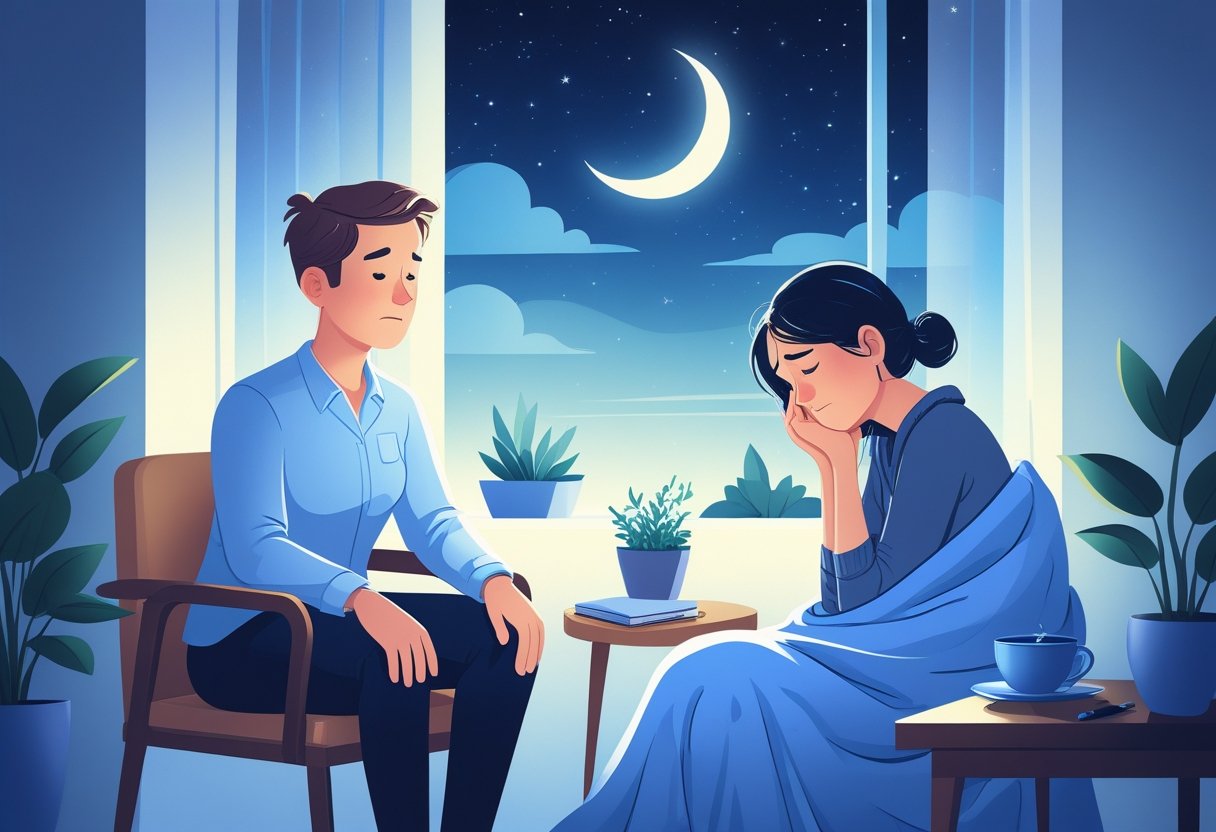
How the Right Mattress Supports Better Sleep for PTSD Recovery
A mattress with the right balance of comfort and support helps in improving sleep for people with PTSD. Quality sleep gives the brain time to process emotions and memories, which supports healing. When choosing a mattress, firmness, pressure relief, and motion isolation are important. A mattress that eases pressure points reduces tossing and turning, which encourages longer and uninterrupted rest.
Cooling features in a mattress are also nice to have as help regulate body temperature. This benefits those who face night sweats or overheating during sleep due to PTSD.
Key mattress qualities for PTSD recovery include:
- Support: Keeps the spine aligned and reduces discomfort.
- Pressure relief: Has softness to ease stress on joints and muscles.
- Motion isolation: Minimizes disturbances from a partner’s movements, helping prevent waking up.
- Cooling properties: Avoids overheating that can interrupt sleep.
Using a mattress with these features creates a more restful sleep environment. Sleep trackers and temperature-regulating mattresses also provide valuable insights for anyone working to improve sleep quality.
The right mattress serves as an important step alongside therapy and other treatments for PTSD. Boring All-Foam Mattress has balanced firmness and effective motion isolation, which may contribute to a more restful sleep experience. The mattress’s all-foam design provides consistent support that helps maintain proper spinal alignment and eases the physical discomfort that can worsen anxiety and restlessness. Its pressure-relieving foam reduces tossing and turning, which benefits those whose PTSD symptoms cause frequent awakenings.
Moreover, the Boring All-Foam Mattress absorbs motion well. It minimizes disturbances from a restless partner or sudden movements during the night. This feature supports longer and uninterrupted sleep cycles, critical for emotional regulation and recovery from PTSD-related trauma.
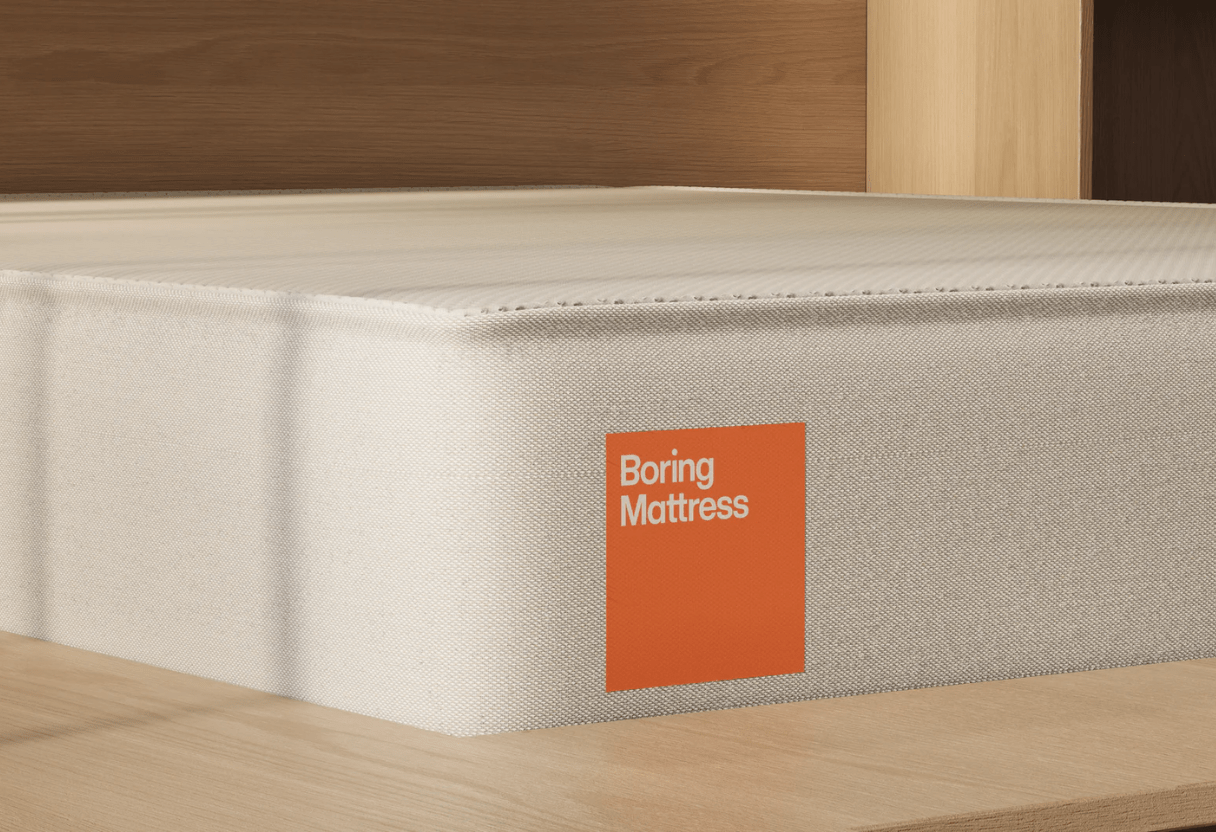
Frequently Asked Questions
PTSD can cause specific sleep problems such as difficulty falling asleep, frequent nightmares, and disrupted sleep cycles. Managing these issues often requires a combination of therapy, medication, and lifestyle changes. Childhood trauma and complex PTSD tend to complicate sleep patterns further.

